
B1.1 / Empower B1 pre_intermediate workbook
.pdf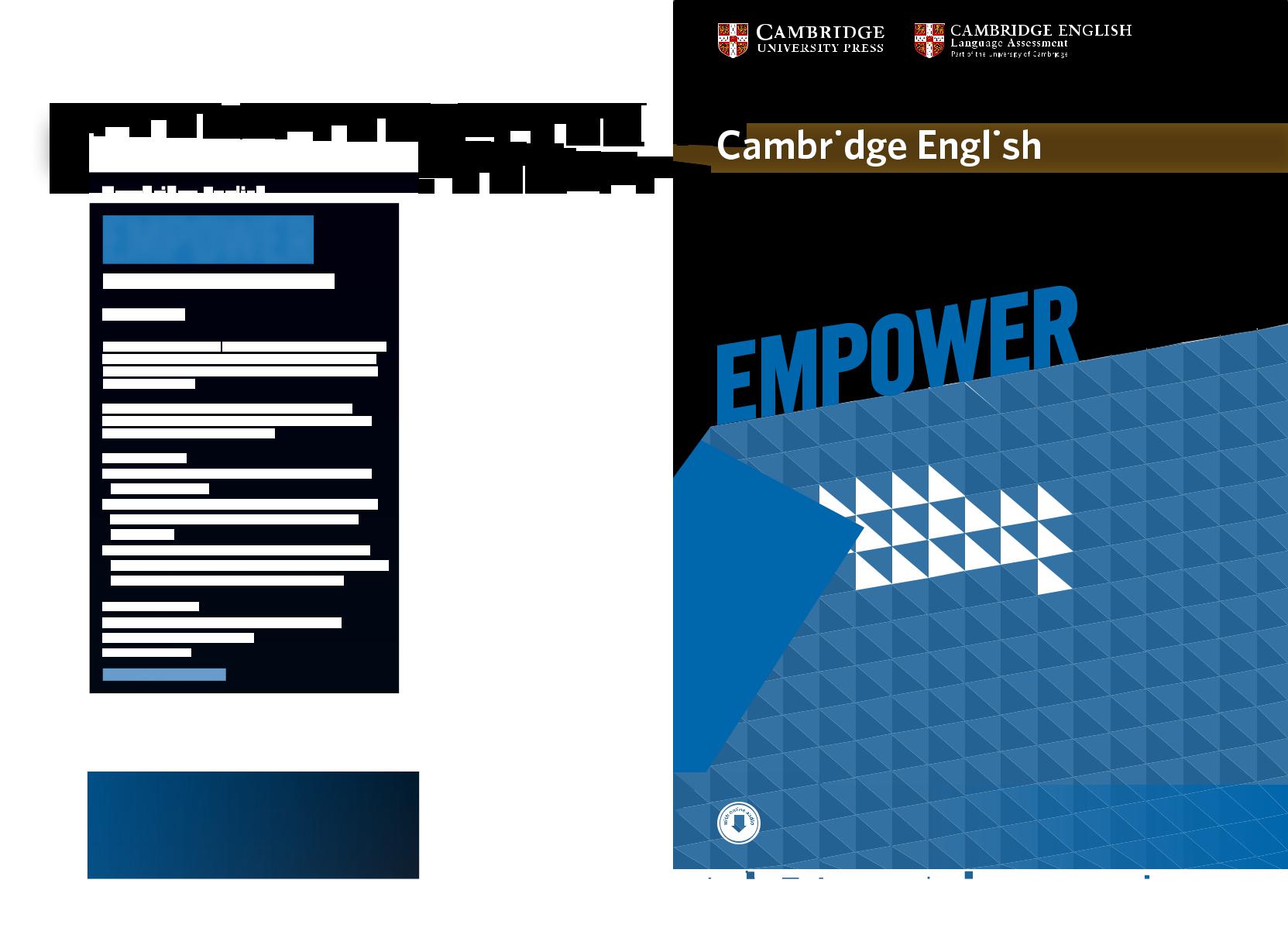
|
|
|
|
|
|
|
|
|
|
|
|
|
|
|
|
|
|
|
|
|
|
|
|
|
|
|
|
|
INTERMEDIATE |
||
- |
|
|
|||||
|
|
|
|
PRE |
|
WORKBOOK |
|
|
|
|
|
|
|
||
|
|
|
|
WITHOUT |
ANSWERS |
||
|
|
|
|
|
|||
B1 





Peter Anderson
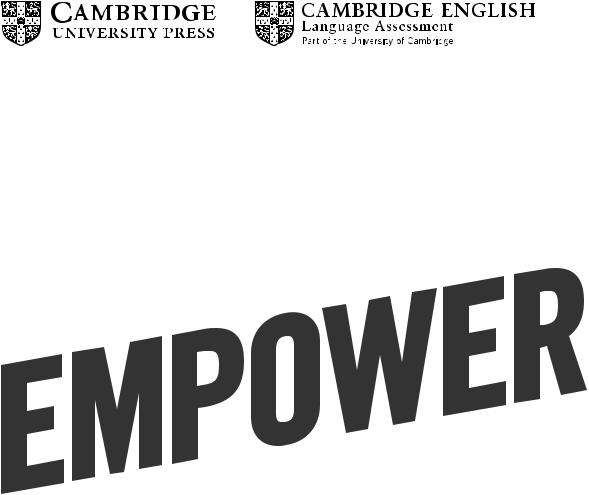
|
|
|
|
|
|
|
|
|
|
|
|
|
|
|
|
|
|
|
|
|
|
|
PRE |
-INTERMEDIATE |
|||
|
|
WORKBOOK |
||||
|
|
|
|
|
||
|
|
WITHOUT |
ANSWERS |
|||
|
|
|
||||
B1
Peter Anderson




 Contents
Contents


































Unit 1 Communicating |
|
|
Page |
|
1A |
Do you play any sports? |
Grammar Question forms |
|
4 |
|
|
Vocabulary Common adjectives |
|
|
1B |
I’m really into Facebook |
Grammar Present simple and present continuous |
Pronunciation Long and short vowels |
5 |
|
|
Vocabulary Adverbs |
|
|
1C |
It was really nice to meet you |
Everyday English Greeting people; Ending a conversation |
Pronunciation Sentence stress |
6 |
1D |
I’m sending you some photos |
Reading An email about a holiday |
Writing skills Correcting mistakes |
7 |
|
|
|
Writing A reply to an email asking about a holiday |
|
Reading and listening extension |
Reading An article about internet dating |
Listening A conversation about making friends |
8 |
|
Review and extension |
WORDPOWER like |
|
9 |
|
Unit 2 Travel and Tourism |
|
|
|
|
2A |
We had an adventure |
Grammar Past simple |
Pronunciation -ed endings |
10 |
|
|
Vocabulary Tourism |
|
|
2B |
Everyone was waiting for me |
Grammar Past continuous |
Pronunciation Sentence stress: vowel sounds |
11 |
|
|
Vocabulary Travel collocations |
|
|
2C |
What time’s the next train? |
Everyday English Asking for information in a public place |
Pronunciation Joining words |
12 |
2D |
This city is different, but very |
Reading A travel blog |
Writing skills Linking words |
13 |
|
friendly |
|
Writing A blog post |
|
Reading and listening extension |
Reading An article about a race |
Listening A conversation about travel problems |
14 |
|
Review and extension |
WORDPOWER off |
|
15 |
|
Unit 3 Money |
|
|
|
|
3A |
Have you ever helped a |
Grammar Present perfect or past simple |
|
16 |
|
stranger? |
Vocabulary make / do / give collocations |
|
|
3B |
I’ve already spent my salary |
Grammar Present perfect with just, already and yet |
|
17 |
|
this month |
Vocabulary Money |
|
|
3C |
Do you have anything |
Everyday English Talking to people in shops |
Pronunciation Sentence stress |
18 |
|
cheaper? |
|
|
|
3D |
We’ve successfully raised |
Reading An email about raising money for charity |
Writing skills Paragraphing |
19 |
|
£500 |
|
Writing An email to colleagues about a charity |
|
Reading and listening extension |
Reading An article about saving money |
Listening A conversation about helping people |
20 |
|
Review and extension |
WORDPOWER just |
|
21 |
|
Unit 4 Social Life |
|
|
|
|
4A |
I’m going to the hairdresser’s |
Grammar Present continuous and going to |
Pronunciation Sound and spelling: going to |
22 |
|
tomorrow |
Vocabulary Clothes and appearance |
|
|
4B |
Shall we go to the market? |
Grammar will / won’t / shall |
Pronunciation Sound and spelling: want and won’t |
23 |
|
|
Vocabulary Adjectives: places |
|
|
4C |
Are you doing anything on |
Everyday English Making arrangements |
Pronunciation Sentence stress |
24 |
|
Wednesday? |
|
|
|
4D |
Are you free on Saturday? |
Reading An email invitation |
Writing skills Inviting and replying |
25 |
|
|
|
Writing A reply to an invitation |
|
Reading and listening extension |
Reading An article about a fi lm director’s day |
Listening A conversation about summer plans |
26 |
|
Review and extension |
WORDPOWER look |
|
27 |
|
Unit 5 Work |
|
|
|
|
5A |
I have to work long hours |
Grammar must / have to / can |
|
28 |
|
|
Vocabulary Work |
|
|
5B |
I might get a job today! |
Grammar will and might for predictions |
|
29 |
|
|
Vocabulary Jobs |
|
|
5C |
I’ll fi nish things here, if you |
Everyday English Offers and suggestions |
Pronunciation Sentence stress: vowel sounds |
30 |
|
want |
|
|
|
5D |
I am writing to apply for a job |
Reading A job advert and a letter |
Writing skills Organising an email |
31 |
|
|
|
Writing A letter applying for a job |
|
Reading and listening extension |
Reading An article about studying and careers |
Listening A conversation about jobs |
32 |
|
Review and extension |
WORDPOWER job and work |
|
33 |
|
Unit 6 Problems and Advice |
|
|
|
|
6A |
You should have a break |
Grammar Imperative; should |
Pronunciation Sound and spelling: /u/ and / / |
34 |
|
|
Vocabulary Verbs with dependent prepositions |
|
|
6B |
I was very frightened |
Grammar Uses of to + infi nitive |
|
35 |
|
|
Vocabulary -ed / -ing adjectives |
|
|
6C |
What do you think I should do? |
Everyday English Asking for and giving advice |
Pronunciation Main stress |
36 |
6D |
I often worry about tests and |
Reading An email asking for advice |
Writing skills Linking: ordering ideas and giving examples |
37 |
|
exams |
|
Writing An email giving advice |
|
Reading and listening extension |
Reading A magazine advice column |
Listening A conversation about problems with studying |
38 |
|
Review and extension |
WORDPOWER verb + to |
|
39 |
|
2
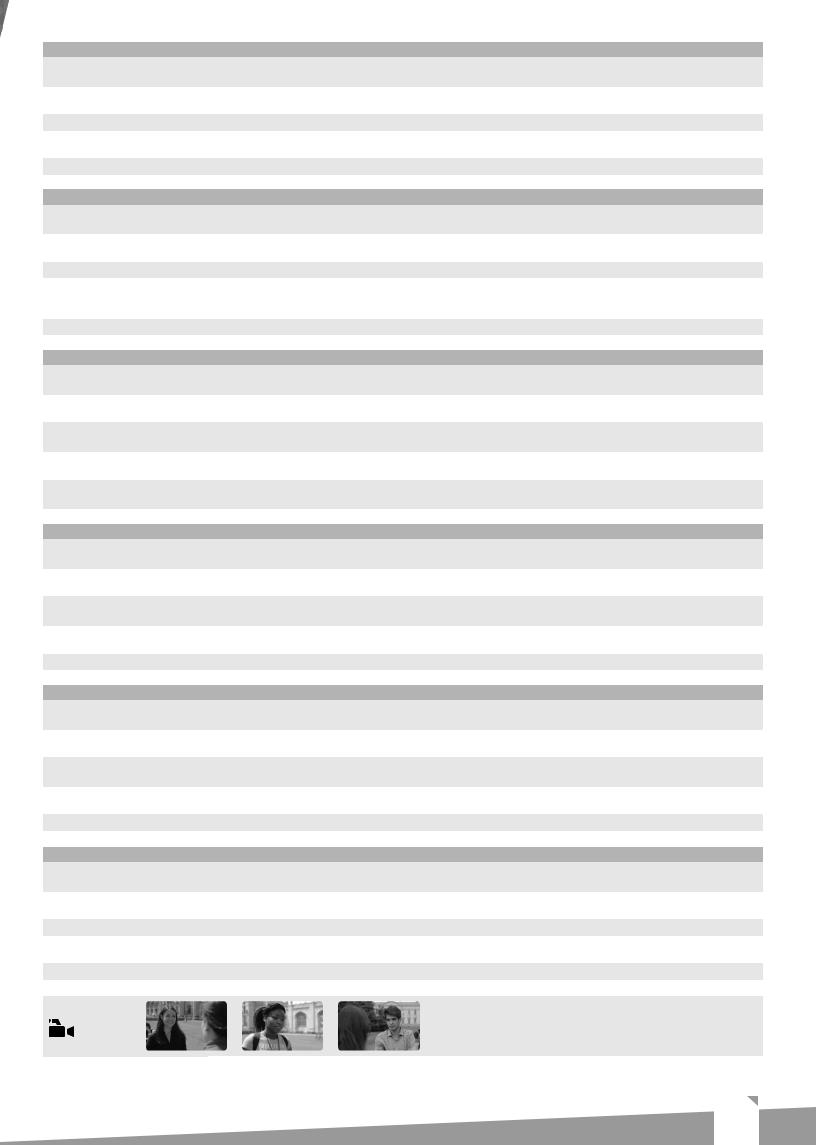
Unit 7 Changes |
|
|
Page |
7A I’m the happiest I’ve ever |
Grammar Comparatives and superlatives |
|
40 |
been |
Vocabulary get collocations |
|
|
7B I didn’t use to eat healthy |
Grammar used to |
|
41 |
food |
Vocabulary Health collocations |
|
|
7C It hurts all the time |
Everyday English Doctors’ questions |
Pronunciation Tones for asking questions |
42 |
7D After that, I decided to make |
Reading A blog |
Writing skills Linking: ordering events |
43 |
a change |
|
Writing A blog post about making changes |
|
Reading and listening extension |
Reading An article about how things were in the past |
Listening A conversation about changes |
44 |
Review and extension |
WORDPOWER change |
|
45 |
Unit 8 Culture |
|
|
|
8A My favourite book is based on |
Grammar The passive: present and past simple |
|
46 |
a true story |
Vocabulary Art and music; Common verbs in the passive |
|
|
8B I’ve hated rugby since I was |
Grammar Present perfect with for and since |
Pronunciation Word stress |
47 |
at school |
Vocabulary Sports and activities |
|
|
8C I’m really sorry I haven’t called |
Everyday English Apologies and excuses |
Pronunciation Tones for continuing or fi nishing |
48 |
8D I couldn’t put the book down |
Reading A review of a famous book |
Writing skills Positive and negative comments; |
49 |
|
|
Linking: although, however |
|
|
|
Writing A book review |
|
Reading and listening extension |
Reading An article from a tourist brochure |
Listening A conversation about tourism in Australia |
50 |
Review and extension |
WORDPOWER by |
|
51 |
Unit 9 Achievement |
|
|
|
9A If I don’t pass this exam, |
Grammar First conditional |
Pronunciation Word groups |
52 |
I won’t be very happy |
Vocabulary Degree subjects; Education collocations |
|
|
9B I managed to stop feeling shy |
Grammar Verb patterns |
|
53 |
|
Vocabulary Verbs followed by to + infi nitive / verb + -ing |
|
|
9C Who’s calling, please? |
Everyday English Telephoning people you know; |
Pronunciation Main stress: contrastive |
54 |
|
Telephoning people you don’t know |
|
|
9D Online courses are new to me |
Reading The profi le of a French student |
Writing skills Avoiding repetition |
55 |
|
|
Writing A student profi le |
|
Reading and listening extension |
Reading An article about studying in the UK |
Listening A conversation between a student and a |
56 |
|
|
professor |
|
Review and extension |
WORDPOWER Multi-word verbs with put |
|
57 |
Unit 10 Values |
|
|
|
10A Would you do the right thing? |
Grammar Second conditional |
Pronunciation Sentence stress: vowel sounds |
58 |
|
Vocabulary Multi-word verbs |
|
|
10B I’m too embarrassed to |
Grammar Quantifi ers; too / not enough |
Pronunciation Word stress |
59 |
complain |
Vocabulary Noun formation |
|
|
10C Can I exchange it for |
Everyday English Returning goods and making |
Pronunciation Sentence stress |
60 |
something else? |
complaints |
|
|
10D We’re really sorry we missed it |
Reading Emails with apologies |
Writing skills Formal and informal language |
61 |
|
|
Writing An email to apologise |
|
Reading and listening extension |
Reading An article about smartphones |
Listening A conversation about online shopping |
62 |
Review and extension |
WORDPOWER Multi-word verbs with on |
|
63 |
Unit 11 Discovery and Invention |
|
|
|
11A It’s a robot that looks like a |
Grammar Defi ning relative clauses |
Pronunciation Word stress: compound nouns |
64 |
human |
Vocabulary Compound nouns |
|
|
11B I think they discovered it by |
Grammar Articles |
Pronunciation Stress in adverbials |
65 |
chance |
Vocabulary Adverbials: luck and chance |
|
|
11C It’s straight ahead |
Everyday English Asking for and giving directions in a |
Pronunciation Sound and spelling: / / and / / |
66 |
|
building |
|
|
11D In my opinion, it’s because of |
Reading Opinions about important inventions |
Writing skills Expressing results and reasons |
67 |
the Internet |
|
Writing A web post giving an opinion |
|
Reading and listening extension |
Reading An amazing story |
Listening A conversation about a crime |
68 |
Review and extension |
WORDPOWER Preposition + noun |
|
69 |
|
|
|
|
Unit 12 Characters |
|
|
|
12A I had always thought they |
Grammar Past perfect |
Pronunciation Sound and spelling: / /, / / and / / |
70 |
were dangerous |
Vocabulary Animals |
|
|
12B He said I was selfi sh! |
Grammar Reported speech |
Pronunciation Word stress |
71 |
|
Vocabulary Personality adjectives |
|
|
12C I’m pretty sure it’s Japanese |
Everyday English Agreeing and disagreeing |
Pronunciation Main stress: contrastive |
72 |
12D About an hour later, the rain |
Reading A story about a helpful act |
Writing skills Linkers: past time |
73 |
stopped |
|
Writing A story about an accident and a rescue |
|
Reading and listening extension |
Reading An article about buying a zoo |
Listening A conversation about a bad experience |
74 |
Review and extension |
WORDPOWER age |
|
75 |
|
|
|
|
Vox pop video |
|
|
76 |
|
|
|
|
Audioscripts |
|
|
82 |
3
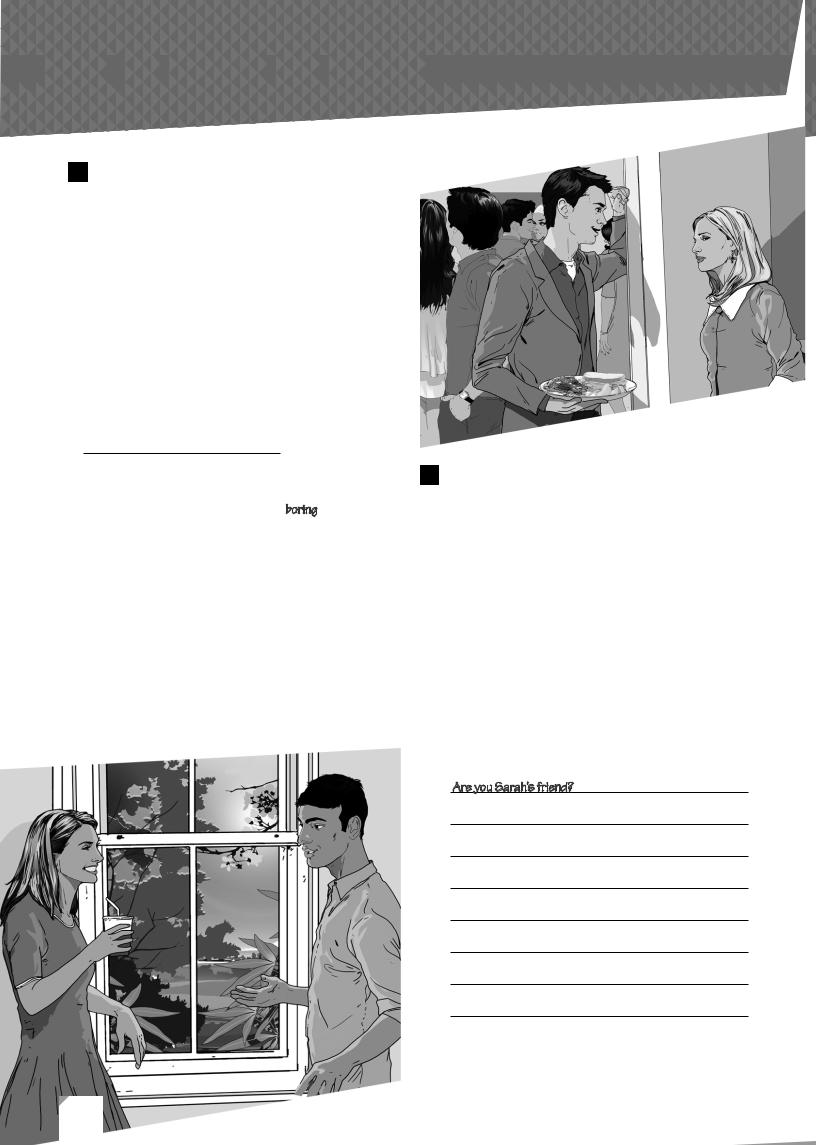


 1A
1A
 Do
Do you play
you play any
any sports?
sports?





















1 VOCABULARY Common adjectives
aUnderline the correct words to complete the sentences.
1The new building opposite the university is rude / ugly / alright. I hate it!
2Our new teacher is always very serious / silly / rude. We work very hard in her lessons and she never smiles or laughs.
3The cakes in the new baker’s are silly / serious / delicious!
4My brother’s new girlfriend is ugly / gorgeous / delicious. I think she’s a fashion model.
5We played lots of silly / horrible / perfect games at Sarah’s birthday party. I’ve got some really funny photos on Facebook.
6Lily’s a perfect / strange / lovely person. Her grandchildren love visiting her.
bComplete the sentences with the adjectives in the box.
|
boring alright |
awful amazing |
|
|
|
|
|
|||||||||
|
delicious rude |
strange perfect |
|
|
|
|
|
|||||||||
|
|
|
|
|
|
|
|
|
|
boring |
. |
|
|
|||
1 |
I’m not interested in football. It’s so |
|
|
|
||||||||||||
2 |
Thanks for the chocolates. They were |
|
|
|
|
! |
||||||||||
3 |
Look at this beautiful weather – it’s a |
|
|
|
|
day to |
||||||||||
|
go to the beach. |
|
|
|
|
|
|
|
|
|
|
|
|
|
||
4 |
The fi lm we saw last night was really |
|
|
|
|
. |
|
|||||||||
|
I didn’t understand it at all. |
|
|
|
|
|
||||||||||
5 |
A How was the restaurant? |
|
|
|
|
|
||||||||||
|
B Oh, it was |
|
|
|
|
. There are better Italian |
||||||||||
|
restaurants in my town. |
|
|
|
|
|
||||||||||
6 |
The weather in Scotland was |
|
|
|
|
. It rained |
||||||||||
|
every day. |
|
|
|
|
|
|
|
|
|
|
|
|
|
||
7 |
The band were |
|
|
|
|
|
! It was the best concert I’ve |
|||||||||
|
ever been to. |
|
|
|
|
|
|
|
|
|
|
|
|
|
||
8 |
The waiter in the hotel was |
|
|
. He said we |
||||||||||||
|
were stupid because we couldn’t speak English very well! |
|||||||||||||||
2 GRAMMAR Question forms
aUnderline the correct words to complete the questions.
1How many children he does have / does he have / does have he?
2Where did you meet / did meet you / you met your husband?
3Did he grow up / He grew up / He did grow up in this area?
4What was like the fi lm / was the fi lm like / the fi lm was like?
5How much paid you / you did pay / did you pay for your smartphone?
6Why she go / Why she went / Why did she go to the USA?
7How many fi lms he made / did he make / did make he last year?
8How was your holiday / your holiday was / did your holiday be?
bPut the words in the correct order to make questions.
1you / Sarah’s friend / are ?
Are you Sarah’s friend?
2work / a bank / he / does / in ?
3you / last month / to New York / go / did / why ?
4like / that new Brazilian / what / restaurant / is ?
5with your sister / who / that man / was ?
6TV programmes / you / do / watch / what type of ?
7go to / did / which university / you ?
8did / how much / cost / the tickets ?
4
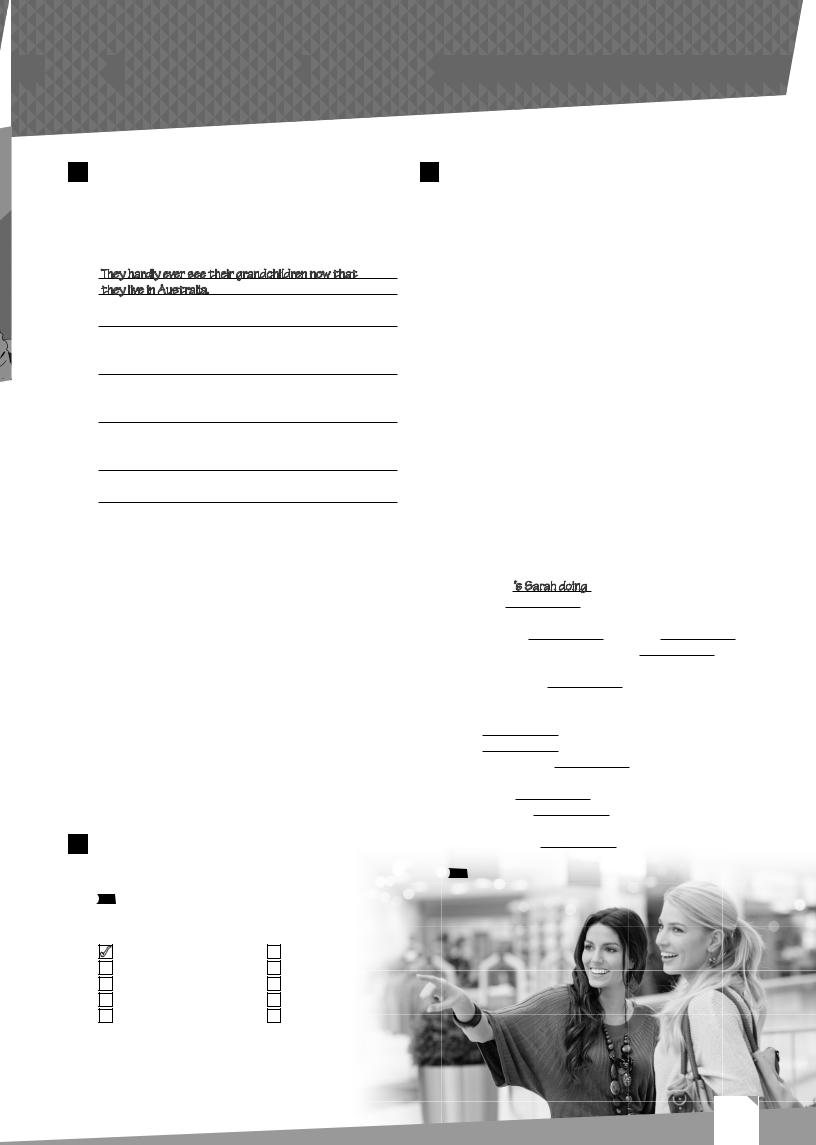

 1B
1B
 I’m really into
I’m really into Facebook
Facebook




















1 |
VOCABULARY Adverbs |
3 |
GRAMMAR Present simple and |
a |
Put the words in brackets in the correct place in each |
|
present continuous |
|
|
||
|
sentence. |
a Underline the correct verb forms to complete the |
|
|
1 They see their grandchildren now that they live in |
sentences. |
|
|
Australia. (hardly ever) |
1 |
She is loving / loves / love reading fashion magazines at |
|
They hardly ever see their grandchildren now that |
||
|
|
the hairdresser’s. |
|
|
they live in Australia. |
|
|
|
2 |
We usually are going / goes / go to the café opposite the |
|
|
2 I enjoy watching old Hollywood movies. (particularly) |
||
|
|
hotel. |
|
|
|
|
|
|
3 She hates it when people are late for meetings. |
3 |
I ’m reading / read / reading a great book in English at the |
|
|
moment. |
|
|
(absolutely) |
|
|
|
4 |
He ’s wanting / does want / wants to phone his family in |
|
|
|
||
|
4 We go to Italian restaurants, but sometimes we also go to |
|
Tokyo. Can he use this phone? |
|
5 |
Why are you waiting / do you wait / you waiting for the bus? |
|
|
Turkish ones. (generally) |
||
|
|
Let’s walk home. |
|
|
|
|
|
|
5 We’re sure his fl ight arrives at Terminal 2, but I need to |
6 |
I hardly ever am visiting / visit / visits my cousins in |
|
|
Ireland. |
|
|
check it. (pretty) |
|
|
|
7 |
She studies / studying / ’s studying French politics at |
|
|
|
||
|
6 I hope she brings her gorgeous brother to the party! (really) |
|
university this term. |
|
8 |
Yes, they’re here. They play / ’re playing / playing a |
|
|
|
||
computer game in the living room.
bUnderline the correct adverbs to complete the sentences.
1I love rock music, but I absolutely / especially / fairly like The Rolling Stones. They’re my favourite band.
2He hardly ever / never / especially phones his mother – maybe once or twice a month.
3I rarely / pretty / normally enjoy horror fi lms, but this one was awful!
4She’s fairly / absolutely / rarely good-looking, but I don’t think she’s beautiful.
5I never / really / hardly ever hate maths. I just don’t understand it!
6She generally / particularly / rarely takes her family out for dinner – only when it’s her birthday.
7They love all sports, but they’re fairly / mainly / pretty interested in football. They watch all the matches on TV.
8It’s pretty / normally / rarely cold today, so why don’t you take your gloves?
2 PRONUNCIATION
Long and short vowels
a  1.1 Listen to the words. Do the letters in bold make long or short vowel sounds? Tick ( ) the words with long vowel sounds.
1.1 Listen to the words. Do the letters in bold make long or short vowel sounds? Tick ( ) the words with long vowel sounds.
1 |
birthday |
6 |
silly |
2 |
bank |
7 |
music |
3 |
cinema |
8 |
sport |
4 |
food |
9 |
friendly |
5 |
party |
10 |
blog |
bComplete the conversation with the present simple or present continuous forms of the verbs in brackets. Use contractions where possible.
ALICE |
What 1 ’s Sarah doing (Sarah, do) in that shop? |
|
NAOMI |
She 2 |
(buy) some postcards to send to |
|
her family. |
|
ALICE |
Really? I 3 |
generally 4 |
|
(not send) postcards. I usually 5 |
|
|
(write) a message on my Facebook wall. And |
|
|
sometimes I 6 |
(put) a few photos of |
|
my holiday on my wall. |
|
NAOMI |
Yes, me too, but Sarah’s grandparents |
|
|
7 |
(not have) a computer, so she |
|
|
|
|
8 |
(send) them postcards instead. |
|
|
|
ALICE |
Oh, and what 9 |
(Tom and Jack, do) |
|
this morning? |
|
NAOMI |
They 10 |
(spend) the day at the beach. |
ALICE |
But Tom 11 |
(not like) swimming in the |
|
sea. He says the water’s too cold. |
|
NAOMI |
Yes, but it 12 |
(be) really hot today! |
c  1.2 Listen and check.
1.2 Listen and check.
5



 1C
1C
 Everyday
Everyday English
English




































 It was really nice to meet you
It was really nice to meet you

























1 USEFUL LANGUAGE
Greeting people; Ending a conversation
aUnderline the correct words to complete the conversation.
SAM Hi, James! 1Much / Long / Very time no see! How are you?
JAMES Hi, Sam. I’m fi ne, thanks. 2What a / What / How lovely surprise! Great to see you!
SAM Yes, it’s really nice 3see you / to see you / you see, too.
JAMES Where are you living 4today / this day / these days?
SAM Oh, not 5far from / far of / far away here. In Park Road, near the sports centre.
JAMES Oh, 6what / how / who nice!
SAM And 7she is / it is / this is my wife, Jackie.
JAMES Your wife – wow! That’s fantastic 8new / news / notices! Nice to 9meet / meat / meeting you, Jackie.
JACKIE Nice to meet you, 10two / too / to.
b 1.3 Listen and check.
1.3 Listen and check.
cComplete the sentences with the words in the box.
|
|
surprise hello |
meet news |
again |
|
||||||||||||||||||
|
|
time last nice |
must |
up |
|
|
|
|
|
|
|
||||||||||||
|
|
|
|
|
|
|
|
|
|
|
|
|
|
|
|
|
|
|
|
|
|
|
|
1 |
Sea View Road? Oh, how |
nice |
|
! |
|
|
|
|
|
||||||||||||||
2 |
Your husband – wow! That’s fantastic |
|
|
! |
|||||||||||||||||||
3 |
We really |
|
|
|
|
|
|
|
|
|
go. We’re late. |
|
|||||||||||
4 |
What a lovely |
|
|
|
|
|
|
|
|
|
! |
|
|
|
|
|
|
|
|
||||
5 |
Say |
|
|
|
|
|
|
to Roger for me. |
|
||||||||||||||
6 |
Long |
|
|
|
|
|
|
no see! |
|
|
|
|
|
|
|
||||||||
7 |
It was really nice to |
|
|
|
|
|
|
|
you. |
|
|||||||||||||
8 |
We must meet |
|
|
|
|
|
|
|
|
|
soon. |
|
|||||||||||
9 |
It was great to see you |
|
|
|
|
|
. |
|
|
||||||||||||||
10 |
When did we |
|
|
|
|
|
|
|
|
see each other? |
|
||||||||||||
d  1.4 Listen and check.
1.4 Listen and check.
6
2 PRONUNCIATION
Sentence stress
a  1.5 Listen to the sentences and underline the stressed words.
1.5 Listen to the sentences and underline the stressed words.
1I’m pretty sure it was two months ago.
2What a lovely surprise!
3It was really nice to meet you.
4I’m sorry, but I really must go.
5Where are you living these days?
6I’m late for a meeting.
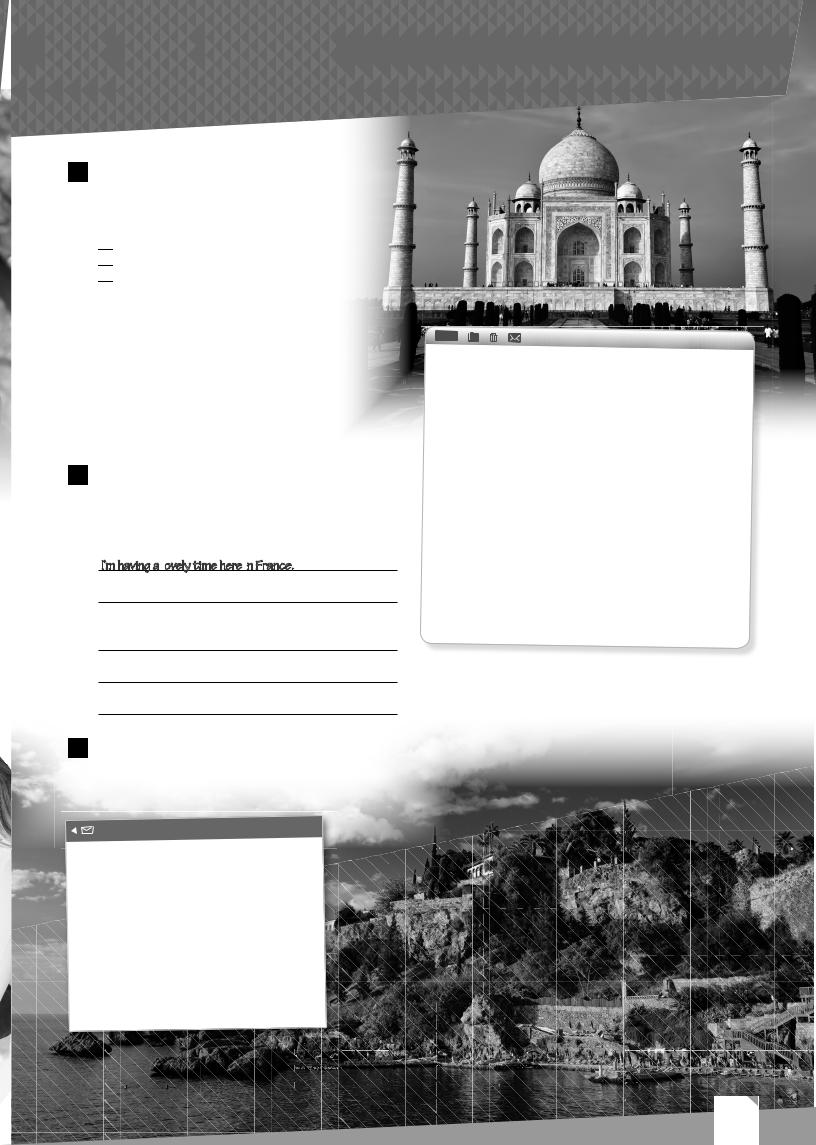


 1D
1D Skills
Skills for Writing
for Writing































 I’m sending you some photos
I’m sending you some photos 
























1 READING
aRead Nandeep’s email to Hannah and tick ( ) the correct answer.
a  Nandeep is staying at the Taj Mahal hotel in Delhi. b
Nandeep is staying at the Taj Mahal hotel in Delhi. b 
 Nandeep is visiting his cousins in Boston.
Nandeep is visiting his cousins in Boston.
c 
 Nandeep is on holiday at his aunt and uncle’s house in Delhi.
Nandeep is on holiday at his aunt and uncle’s house in Delhi.
bRead the email again. Are the sentences true or false?
1 Nandeep mainly speaks in Hindi to his cousins. 2 He’s visiting lots of places while he’s in India.
3 The Taj Mahal is in Delhi.
4 Nandeep didn’t enjoy visiting the Taj Mahal.
5 Nandeep often uses his aunt and uncle’s pool.
6 Nandeep isn’t enjoying his holiday.
2 WRITING SKILLS
Correcting mistakes
aCorrect the sentences.
1I’m having a lovely time here in france.
I’m having a lovely time here in
time here in France.
France.
2Yesterday we visitted the Palace of Versailles near Paris.
3In the mornings, I usually going to the beach with my Portuguese friends.
Inbox
Hi Hannah,
I hope you’re enjoying your stay in Boston.
I’m spending a month on holiday in India. I’m staying with my aunt and uncle and my two cousins in Delhi. I don’t speak much Hindi, but they all speak English very well, so communication isn’t a problem. They’re taking me to
see lots of really interesting places. Yesterday we drove
to Agra and visited the Taj Mahal. It took two hours to get there. This is a photo I took – what an amazing building!
It’s really hot here all the time, but my aunt and uncle have a swimming pool, so we spend a lot of our time in the water – it’s so relaxing! In the evenings I usually go to
cafés with my cousins and their friends. I’m having a great time here in India! See you soon. Nandeep
4I hope your having a lovely time in Canada with your family.
5Their English are very good, but we always speak in German.
3 WRITING
aRead the email from Paul. Use the notes in brackets to write Becky’s reply.
Hi Becky
Hope you’re having a nice holiday. Tell me all about it! (Describe my holiday)
What’s the hotel like? (Not in a hotel – staying with my family!)
What do you do every day? (Explain and send a photo)
See you soon (he OK? Ask.)
Love Paul
7
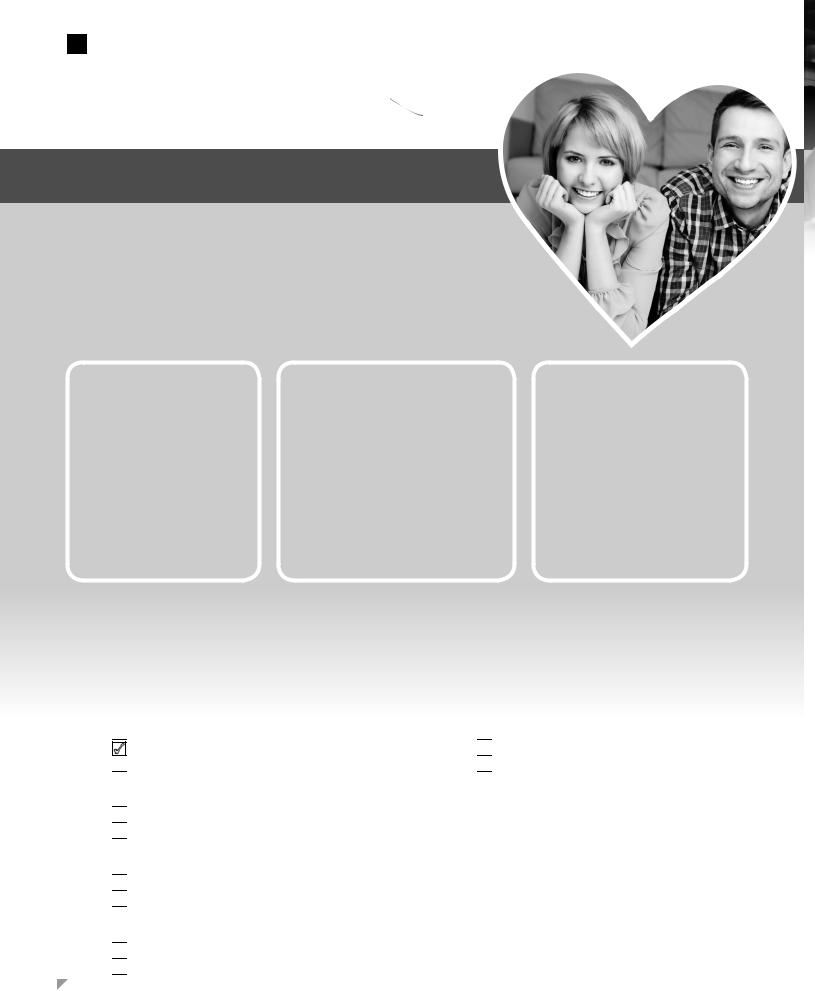
UNIT 1
Reading and listening extension
1 READING
a Read the article. Match the statements 1–3 with the people a–c.
1 |
I don’t think internet dating is a good way to meet people. |
a |
Joanna |
2 |
Most people I’ve met online are friendly. |
b |
Stephen |
3 |
I’m very happy with the person I met online. |
c |
Colm |
INTERNET DATING:
How is it for you?
Are you looking for that special person? Do you want to meet new people?
Lots of people meet their new partner over the Internet. It is particularly popular in the U.S.A., where about 30% of people meet their partner online. We talked
to some young people in Ireland about their experiences of internet dating.
JOANNA, 23, CORK |
STEPHEN, 28, DUBLIN |
I am dating a man I met on the Internet. His name is Gavin and he is
lovely. We have the same hobbies and we laugh about the same things. We rarely argue and our relationship is perfect. I’m so happy.
I normally wouldn’t meet someone through the Internet. I prefer to meet people face-to- face. I think it’s difficult to know
what a person is like from a photo or some information online.
I want to get to know someone properly, and I don’t think you can do that on the Internet.
COLM, 22, GALWAY
I have several friends who I have met online. It’s a great way to meet new people who have similar interests to you. Sometimes people can be rude but most people are very friendly – it’s great fun! I recommend it as a good way of meeting new people.
There might be some problems with meeting people online, but lots of people are doing it these days, and it helps people meet new people and make new friends. Good luck!
bRead the article again and tick ( ) the best endings for the sentences.
1In the U.S.A. …
a 
 people rarely use the Internet to fi nd love.
people rarely use the Internet to fi nd love.
binternet dating is a normal way to meet people.
c 30% of young people have a boyfriend or girlfriend.
30% of young people have a boyfriend or girlfriend.
2Joanna …
a 
 has met several people online. b
has met several people online. b 
 is very happy in her relationship.
is very happy in her relationship.
c 
 doesn’t think internet dating is right for her.
doesn’t think internet dating is right for her.
3Stephen …
a 
 would like to meet a girl online.
would like to meet a girl online.
b 
 doesn’t want to put a photo of himself online.
doesn’t want to put a photo of himself online.
c 
 doesn’t think that you can get to know people online.
doesn’t think that you can get to know people online.
4Colm thinks that …
a 
 it’s diffi cult to meet people online. b
it’s diffi cult to meet people online. b 
 people are often unfriendly.
people are often unfriendly.
c 
 the Internet is a good way to meet people and have fun.
the Internet is a good way to meet people and have fun.
5The writer of the article thinks that …
a 
 people hardly ever meet someone they like online. b
people hardly ever meet someone they like online. b 
 internet dating can be a good way to meet people. c
internet dating can be a good way to meet people. c 
 internet dating is the best way to meet people.
internet dating is the best way to meet people.
cWrite a paragraph about different ways of meeting new people. Think about:
•different places to meet new people
•some problems with meeting people for the fi rst time
•the stories in the article
•your own experience.
8
